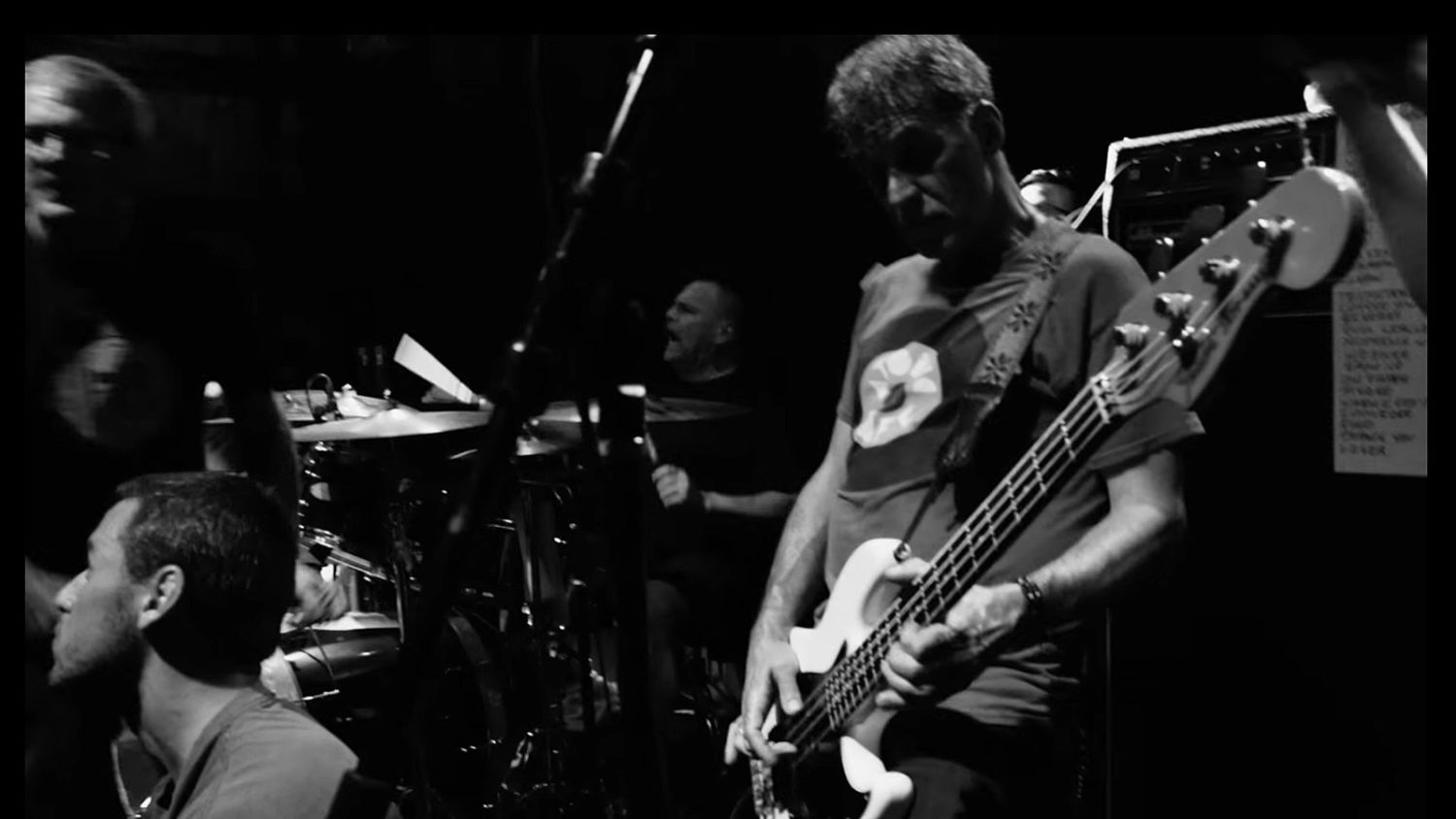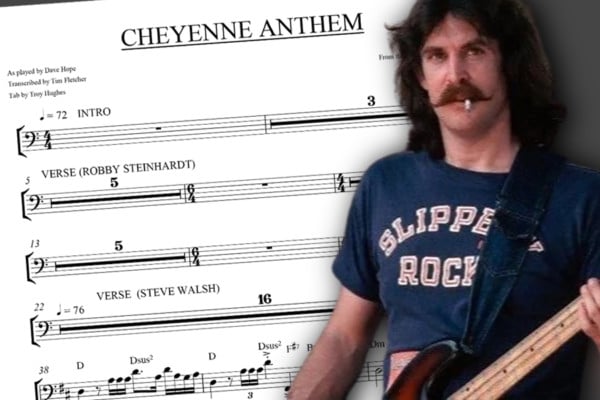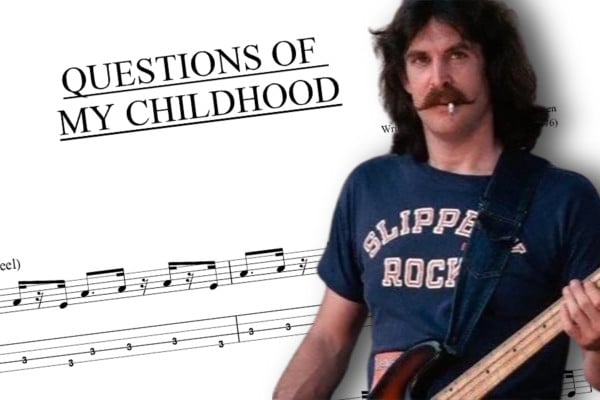Bass Transcription: Karl Alvarez’s Bass Line on “I’m The One” by The Descendents

Karl Alvarez is perhaps best known for his tenure in Californian punk band The Descendents and their off-shoot band ALL. Alvarez is primarily a bassist, but he also sings lead and backing vocals and plays a range of other instruments including guitar, mandolin, double bass, and keyboards, and has used these in many other musical contexts. He has also written many songs for the bands and artists he has worked with and contributed his art skills for covers, inserts, and promotion.
Alvarez was born in Boulder, Colorado on March 10th, 1964, but by 1971, his family moved to Salt Lake City, Utah. At Junior High school, Alvarez became friends with future Descendents’ guitarist Stephen Egerton. Egerton noticed Alvarez was an able writer and asked him to write some lyrics for his band. Later, when Egerton joined Salt Lake City hardcore band The Massacre Guys, Alvarez used his artistic skills to draw flyers for their gigs. When their bass player Jimmy Germ left in 1983, Alvarez was recruited as he knew the songs, even though he didn’t know how to play the bass. The band had an upcoming show supporting the Dead Kennedys, and he was taught to play the bass parts for the songs by Egerton.
With Alvarez, The Massacre Guys recorded two EPs; 1982’s Behind the 8-Ball released by Toxic Shock Records and The Rider (1984) on Unclean Records. They also recorded an album The Government’s Music in 1984. The band toured regularly, supporting punk and hardcore heavyweights TSOL, X, Black Flag, The Dead Kennedys, Minor Threat! and The Minutemen. Sadly, by 1985, the band began to dissolve, as guitarists Stephen Egerton and Paul Krowas left the band. It was difficult to recruit suitable permanent replacements, and after they split up, Alvarez briefly joined Salt Lake City band, Bad Yodelers, as a vocalist. The connections he made during his time in this band led to him being asked to join the Descendents.
Alvarez and Egerton joined The Descendents in late 1986 and the band began to record their fourth studio album All in early 1987. This was to be the last album released with long-term vocalist Milo Aukerman before he left for graduate school – a previous band hiatus had been due to Aukerman attending university as an undergraduate. The remaining band members renamed themselves All after the album and the philosophical concept developed by the band – “doing the utmost, achieving the utmost.” All released seven albums with several different vocalists, before Aukerman’s return in 1996 prompted a reformation of the Descendents. For a while, both bands continued to perform and record new material. All went on to record a further two albums but went on their own hiatus from 2003 to 2008 and have played only intermittently since then. After Aukerman’s return, when his work schedule as a University professor and researcher would permit, The Descendents recorded Everything Sucks (1996), Cool to Be You (2004) and Hypercaffium Spazzinate (2016).
With both The Descendents and All working intermittently, Alvarez filled his time by “taking gigs if they sound interesting.” He formed The Last in 2004 alongside Descendents drummer Bill Stevenson, and they both played on The Lemonheads’ self-titled comeback album in 2006. The same year, Alvarez also briefly toured with Canadian punk band All Systems Go, and then joined gypsy punk band Gogol Bordello for some of their 2006 tour. In 2007 he contributed his keyboard skills on the Coles Whalen album Nothing is too Much. In 2007 and 2009 he toured with Canadian folk/punk band The Real McKenzies – Alvarez stated that his reason for agreeing to work with them was because he “loves bagpipes.” He also played bass and mandolin on their 2010 album Shine not Burn.
More recently, Alvarez has played with soul band The Vexations and he currently plays guitar and sings in three bands; Endless Monster, The Underminer – a rock n roll band, and also The Vultures, a band that revives the 60’s R&B sound.
As a bassist, Alvarez was influenced by a range of musicians from different genres, including Charles Mingus, Geezer Butler, Steve Harris, Chuck Dukowski, and Mike Watt. He has used Fender Jazz, Precision and Jaguar basses, but has also played Musicman and Reverend Mercalli instruments.
“I’m The One”
This was written by Alvarez, and the bass line is surprisingly complex for a punk song.
The intro is built using two chromatically adjacent chords, E and Eb, and this tonal ambiguity continues during the song. “I’m The One” is not a simple three-chord punk song – it uses chords outside the key (C), but these can potentially be explained by the idea of parallel keys. The non-diatonic chords Ab, Bb, and Eb are all from C minor – the parallel minor key of C major. Because all the chords in the song are power chords, this potentially helps to enable the chords from the parallel key to be absorbed into the song. The Db chord only appears briefly, so we can call that a passing chord.
The intro begins with an open E note which is followed by a bar where the first three pairs of quavers use a semitone rising idea. We could see the first of each pair as simply semitone appoggiaturas, with the second of each pair being the root, fifth and octave of the E5 chord. However, the first note in each pair also spells out the root, fifth and octave of the chord in the next bar; Eb. Alvarez uses a similar idea in bars 3 and 4, but the semitone appoggiaturas spell out the root, fifth and octave of a D5 chord, and the second notes in each pair spell out the root-fifth and octave of the Eb5 chord. This leads into a very wide interval of two octaves and a major third using a 13th fret G# and the open E string. The next bar contains a rising crotchet triplet run using most of the notes of the Eb Lydian mode landing on beat one of bar 8. The pickup to the chorus fills out the remainder of bar 8.
In the chorus, Alvarez sticks mainly to root notes, but in the verses he adds runs to add movement to the line – in bars 19 and 20 he uses a semitone B to C movement to start each bar, but in 19 the notes are from the C major triad, and in bar 20 he uses it to lead into a descending run using a section of the C major scale, although this also includes the notes of a second inversion Am7 chord.
Alvarez uses another inversion idea in the pre-chorus, using the third of the major chord to begin bars 27 and 28. In bars 29 and 30, Alvarez plays a rising figure over the F and G chords. In bar 29 the notes are root and fifth of the F chord, and in bar 30 they are the fifth and seventh of a G7 chord.
Bars 31-4 are very much like the intro, and they lead into another chorus, which is followed by a verse, pre-chorus, and chorus as before. The middle section borrows the rhythm of the pre-chorus, but over different chords. Alvarez includes a rising and falling run in bars 71-2 that uses the Am scale over both the A5 and F5 chords, where the first and third beats of the bar are F chord tones, and then again in bars 75 and 76 where this time the descending section starts on F. Bar 77 uses also uses a descending Am scale run, but the corresponding chord movement in bar 79 uses a slightly different version starting on the E note.
The end of the middle section utilizes the last four bars of the intro (like the end of the pre-chorus also) to lead into a final double chorus. The overall performance is driving, and aggressive, but Alvarez includes some intelligent variations to help keep the bass-line interesting, and for a punk song it is varied and melodic.
Follow along with the transcription and the video:



Finally, some coverage on this master player. Karl Alvarez and the other bassists for the Descendents (Doug Carrion and Tony Lombardo) have been really big influences on me. Pop Punk is a great genre for bass players. Thanks for the article and the lesson!
Hi Ruben. Thanks for your comments – they are much appreciated.